Low volume businesses have it tough.
These businesses receive a small amount of customers by design. They’re selling a product or offering a service with inherent restrictions – these limitations make it hard for them to get reviews from customers and manage their reputation.
They’re in a tough spot.
Some are serving customers locally in a small town. Others may be selling a product or service to a tiny segment of the population. A few sell big purchase or single use products. Some are new business with no history, who are struggling to build their reputation. Whatever the case, these organizations are dealing with a small volume of customers.
This means they’re vulnerable.
A negative review for these low volume businesses would be devastating, doing significant damage. A stream of positive reviews could establish them as leaders in the marketplace, way ahead of their competitors.
They have to overcome their low volume challenges first
These businesses experience a significant amount of challenges within their business and their market. What makes these obstacles so challenging is the fact that it’s tough to work around these problems.
What exactly do I mean by challenges?
Problem #1: Selling a one-time purchase with terrible reviews is tough
Some products are single use or one-time purchases.
For example, customers looking to buy an in-ground swimming pool know they’ll be spending upwards of $30,000. They’re also expecting an ongoing monthly fee for maintenance and repairs. They probably won’t be looking to buy another pool afterwards.
Most customers will need a second mortgage to finance their pool of choice. Financing is more difficult to get these days, so customers are naturally more focused on reviews.
The competition is intense, but the volume of customers is low. The absolute last thing customers want to see is a review like this…
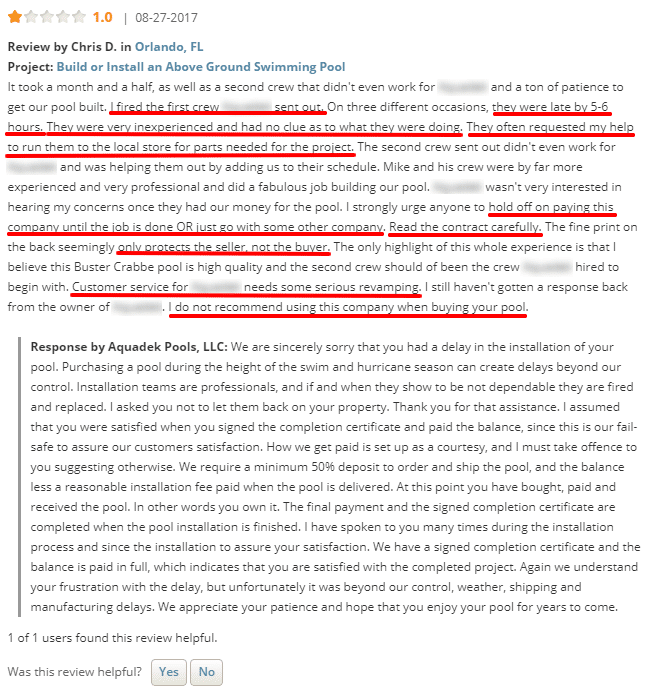
Or this.
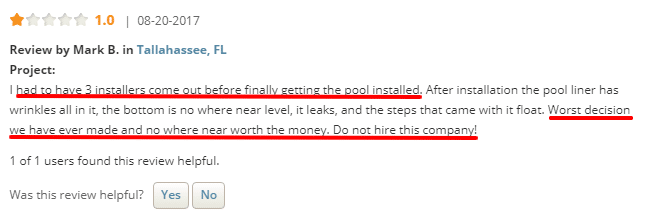
A Google search for this company reveals a two star rating overall. That’s devastating for two reasons:
1. This company is local.
2. In-ground pool installation is a low volume business.
Any customer that searches for this company, will find their poor reviews. Their poor reputation will force them to offer steep discounts and accept a low price to win bids.
This company will have to work incredibly hard, just to get back to neutral.
Here’s how you fix it.
The easiest way to fix the problem with negative reviews and a poor reputation is simply to avoid negative reviews. Almost immediately an objection flares up in our heads. That’s impossible, you can’t make customers say what you want them to!
Force isn’t necessary.
With single use and one-time purchases you set the tone ahead of time.
How you ask?
You…
1. Tell customers that it’s okay for them to share their concerns or complaints. If customers feel free to complain, scold and harass you, they’re far less likely to write a negative review online.
2. Tell them what you’re going to do for them. Show customers your process, what each stage will look like, and how you’ll work for them.
3. Show them what you did for them. Walk customers through the project, give them a tour of the completed project. Ask them if they’d like you to fix, tweak or modify anything on the project. Let them know nothing is too small.
4. Ask them to tell others what you did for them. This is the point where you ask for a positive review. If they’re feeling uncomfortable with the idea of sharing a review, simply head back to step three and try to make things right.
You’ll want to rely on your happy and satisfied customers. Use their reviews as insurance against the negative reviews that come from unhappy and dissatisfied customers. The more reviews you collect, the less damage a negative review can do to your business.
Problem #2: With local businesses, everybody knows everybody
What do small towns, rural areas and low population areas have in common? They’re all low volume areas. If you’re running a local business in a sparsely populated area the volume of customers you receive will obviously be very low.
Reviews and your online reputation, they matter more than ever in this environment.
Why, you ask?
Because most of the time, everybody knows everybody.
A negative review from an influential member of the community is pretty damaging. But, a poor review in general is enough to hurt your business.
It isn’t just the negative review that damages your business…
It’s the bias that’s created against your company. Customers in these environments talk to each other online. That can take the form of a traditional review, or it can be an informal conversation on Facebook or both. If your business is limited to a local setting, you have to deal with both the online and offline reviews that take place around you.
That’s difficult because you’re not always privy to that information.
Here’s how you fix it.
You keep a positive conversation going.
That sounds simple enough, but what does that mean and how do you do it? Start by serving and participating in your community – that can be as simple as…
- Teaching a class locally for your target audience.
- Giving back to the community via charity donations and fundraisers.
- Sponsorships (e.g. little league, police, or fire dept.), giveaways and gifts.
- Protect your target audience from harm.
You’re still requesting online feedback and reviews from your customers. But you’re also creating goodwill and a never ending conversation offline to motivate and attract new customers.
Here’s why this works so well.
1. You’re doing things local customers value. You’re showing that you’re part of the community, that you care and, most importantly, that you’re willing to invest in them.
2. It counteracts the inevitable negative review. Everybody knows everybody. People in small communities talk. If you’re doing everything in number 1, you’ll win the hearts and minds of the majority in your community. When asked, these locals are far more likely to review your business favorable as a show of support.
3. Your actions guide the conversation. Talk is cheap, customers aren’t as open to empty words, your actions show you’re different from the comments made by your naysayers. This protects your business from competitors and it creates genuine followers that care about your business.
Reviews are incredibly important for low volume businesses. They’re even more important for local businesses, so it’s important to manage the online and offline conversation.
Problem #3: Specialists and niches are inherently low volume
Specialty purchases serve a niche market. These products can be practical and utilitarian, emotional and entertaining or a neutral necessity.
Specialty small businesses are defined as:
1. Businesses that specialize in a specific niche e.g. an ad agency that focuses exclusively on active lifestyle and outdoor clients like Gander Mountain, GoPro, Burton, LL Bean, etc. These companies typically have the freedom to choose their specialty and how it works.
2. Professional specialties in a given market e.g. patent attorneys, tax accountants or artists. It’s a common specialty but the supply for these services tends to drastically exceed the demand.
The specialty itself is often the cause of low volume. But the low volume can also be caused by a variety of other factors including (a.) small towns that aren’t able to supply you with the leads or level of business you need or (b.) big cities offer general practitioners lots of work but there’s poor demand for your specialty.
Specialization isn’t a problem on its own but creates a complex set of problems to overcome.
1. Specialists are typically more expensive. This is a huge barrier for many businesses to overcome as most customers are inexperienced about specialists and the nature of their business.
2. Expectations are much, much higher. Customers paying the specialist rate expect a certain kind of authority, demeanor and approach. These customers are spending more so they’re often more demanding with higher expectations.
3. Disappointment leads to punishment and consequences more often. Businesses that fail to manage fuzzy, implicit and unrealistic customer expectations can expect more negative reviews from customers.
Here’s how you fix it.
1. Limit supply and demand even further. You can create an aura of authority, prestige, urgency and a fear of loss around your business. Use that aura to create an ethical and legitimate reason for customers to move themselves through your sales cycle quickly. It seems counter intuitive but it turns the sales dynamic on its head, getting customers to pursue you for business.
2. Create and set customer expectations ahead of time. Flush out your customer’s fuzzy, implicit and unrealistic expectations. Then, deal with them one at a time. Make sure your customers know exactly what they’re getting into ahead of time. Give them clear information on the ins and outs of doing business with you.
3. Show customers that you’ve met their expectations. Feed their expectations back to them, making it clear that you’ve gone above and beyond their wants and needs.
Problem #4: Luxury customers are sparse, demand perfection
When most customers travel they use an online service like Priceline, Expedia, or Travelocity to get the best deal. These customers are very price conscious; they’re willing to rate a site based on whether or not they were happy with the deal they received.
What about luxury travel?
Many wealthy people rely on “travel specialists.” Sites like Zicasso allow high net worth individuals to hire travel specialists to create a handcrafted vacation.
Here’s the problem.
These luxury customers are tough to find and harder to convince. These customers are discerning, they have incredibly high expectations. They often expect one-on-one service, attention to details, customization and lots of handholding.
There’s not very many of these customers.
The Pareto distribution explains why there aren’t that many of these high net worth individuals. This distribution means there are less of these customers to go around and more of the businesses that serve them.
What’s the problem aside from the volume?
Let’s take a look
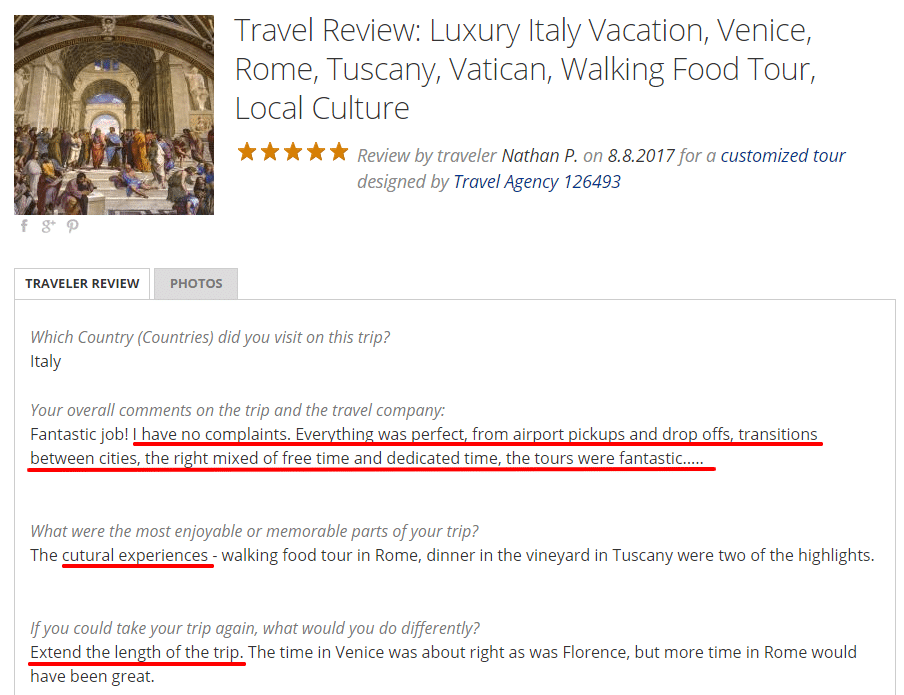
See it?
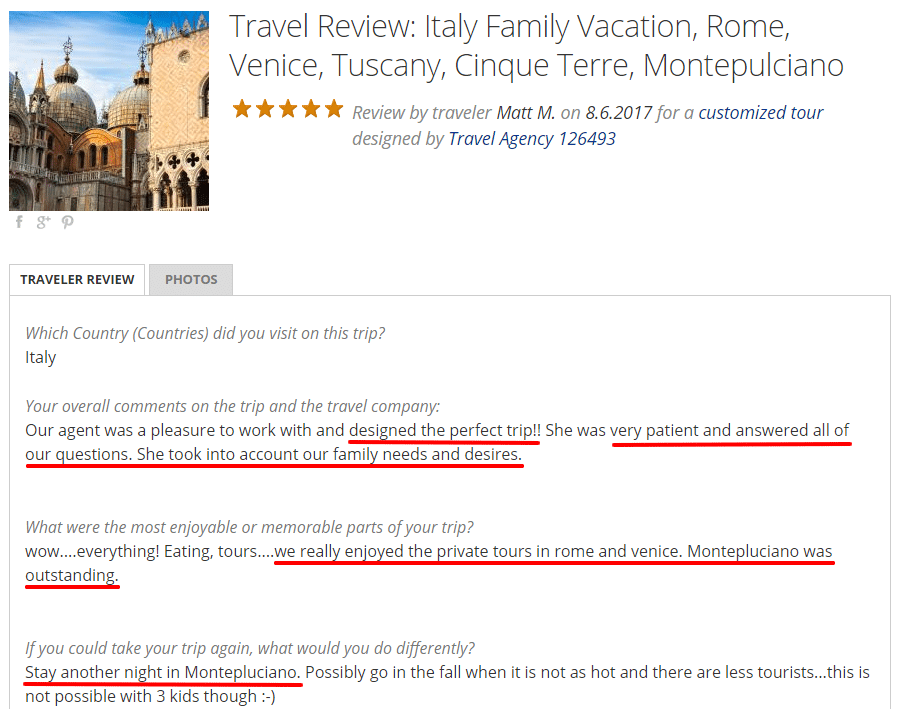
Here it is again.
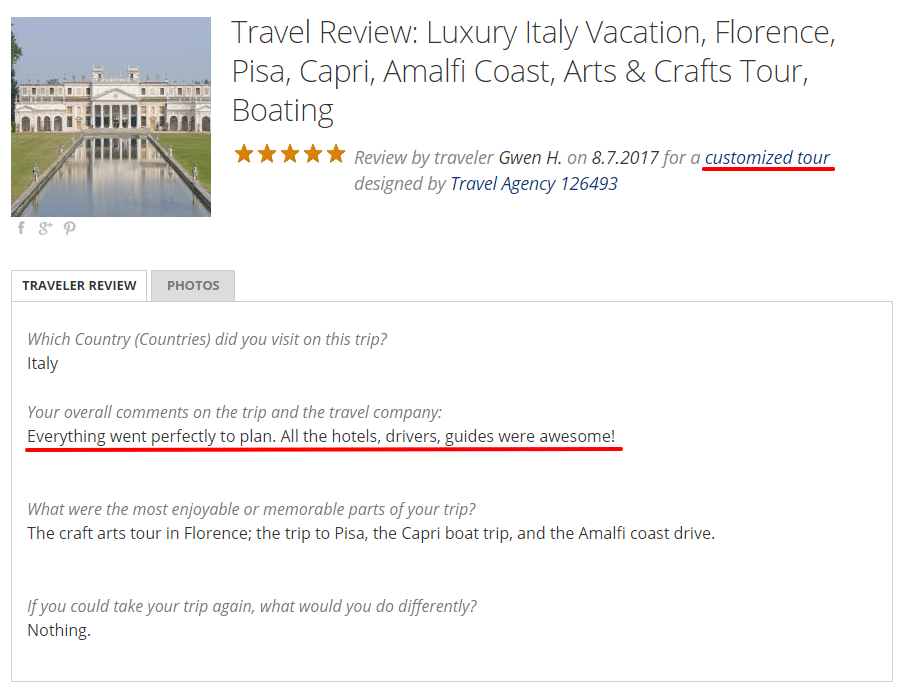
Did you catch it?
Luxury customers demand perfection. They want things to be done according to plan. The customer service, their experience, the activities, the exclusivity and customization – everything needs to meet their very high standards.
This travel agency accomplished that and more.
Fail to meet these requirements and these customers are quick to leave negative reviews. These are devastating because they violate the luxury customer’s core values.
Exclusivity, customization, and perfect execution.
Here’s how you fix it.
The fix is simple. You ask each customer for their feedback. How you ask is just as important as what you ask. Reviews were presented in a “feedback” format, giving these customers the chance to communicate important details.
These details are signaling tools.
They denote class, status and their level of prestige. These reviews are an important piece of the luxury market. A negative review in this market can be catastrophic, simply because it sends the wrong signals. Status and prestige is everything. So, a poor reputation is the touch of death to a product or service provider.
Make no mistake, poor reviews are a disaster for any low volume business.
A portfolio of reviews gives you the tools and resources you need to weather the storm of negative reviews. It’s inevitable, but doesn’t have to end in disaster.
If you’re unprepared, it’s tough to endure – this is why it’s so important that businesses plan for it ahead of time.
Low volume businesses have it tough
These businesses receive a small amount of customers by design. Selling a low volume product comes with inherent restrictions – traditionally, these limitations make it hard for businesses to attract and convert customers. This makes managing your reviews and your reputation, even harder.
These businesses are vulnerable.
You don’t have to be. With the right approach and a carefully planned strategy, your online reviews and your reputation management strategy will thrive – low volume, no worries.
About the Author
Andrew McDermott
Andrew McDermott is the co-founder of HooktoWin. He shows entrepreneurs how to attract and win new customers.










